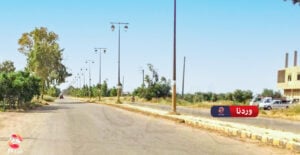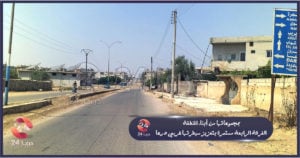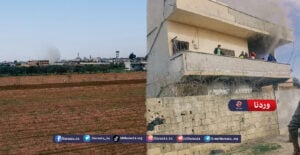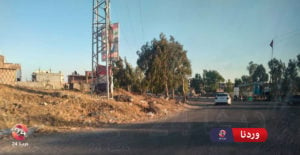Germany sticks to the EU-policy of «no normalization, no reconstruction, no lifting of sanctions” as long as the regime does not engage in the political process».
This is what the German envoy to Syria, Mr. Stefan Schneck, said in an exclusive interview with Daraa 24, and arta fm
1- The security situation is particularly bad at the moment in the north-east and the south of Syria, where assassinations and attacks continue and the situation is very tense. Where are things going in your view? And what role can Germany play in this regard?
The situation in Syria worries me greatly. We see hunger everywhere, impoverished people and a situation where the country falls into three or even more parts. The economic situation is deteriorating and the regime is not ready or able to take up its responsibility to care for their people and their country. We see again and again protests and uprisings in the whole of Syria like lately in the south. And the conflict in the north-east comes with a major risk of destabilizing the already extremely tense situation. We should be very clear: it is Da’esh that will use every distraction of its enemies to regain former strength. This is why we have strongly discouraged Turkey from launching a ground operation. The recent increase in violence in the south comes as no surprise, but is the logical consequence of years of neglect by the regime and the absence of honest reconciliation efforts. Ultimately, none of these problems can be solved in one region alone. Syria needs a political solution for the entire country. Reconciliation must be based on justice for all victims and accountability for all perpetrators of human rights violations. Germany – and its international partners – stand ready to support that process. Right now, however, it is the regime that prevents any progress.
2- The living conditions in Syria have greatly deteriorated, as you know. People across the country are suffering from high prices and the crash of the Syrian lira. It seems the European and American sanctions imposed on Syria have not impacted the authorities as much as they did on people. Could or should the sanctions be lifted in your opinion?
The question of how to ease that suffering is fundamental to our everyday work. This is why Germany has provided more than 10 billion euros in humanitarian assistance since 2011. And this is why there are comprehensive humanitarian exemptions in our sanctions regime. Therefore we regularly adjust our measures whenever our – in fact very targeted – sanctions lead to unintended consequences. In contrast, it is President Assad and his inner circle who are living lives of plenty, who have divided the sad remains of the Syrian economy among them, and who – let us not forget about that – continue to amass billions of dollars from illicit drug trade alone. Cynically, instead of trying to end the misery, the regime seems more determined than ever to make use of it for its propaganda and, ultimately, retention of power.
3- What are your alternatives in case the political process in Syria is stopped? Do you see that Mr Pedersen’s step-for-step initiative is effective? And if so, how do you expect the Syrian regime to respond, and what are your next steps in case the regime responded?
I think it is, first of all, fair to say that I am personally really frustrated with the stagnating political process. For many years now, we all have been witnessing endless delaying tactics of the Syrian regime and its close allies. However and against all odds, I personally remain firmly convinced that we need such a solution, since it is the only way to bring lasting peace to this war-torn country. So what is desperately needed is a way to re-energise the stalling process. And I think it is in this light that we need to see Mr Pedersen’s efforts and the step-for-step approach. Step-for-step is not – and this is very important – an alternative to the political process, but rather an attempt to re-vitalise it. We urge the regime to engage with Mr. Pedersen and his team. It is clear, that without progress in the political process Germany and the EU will not change their policy.
4- What do you think of the work of the Constitutional Committee, and who is responsible for its current dysfunction? Do you expect the Committee to resume its work and things to move towards political change and the implementation of Resolution 2254, or is that history now?
Let me state the obvious first: the Russian obstruction of the Constitutional Committee has led to a complete standstill of the Committee’s work. Now to be honest, we all know that also before June the Constitutional Committee during its eight rounds had not been able to yield any tangible results because of the uncompromising stance of the regime. But at the same time, we must not forget that it still remains the only formal format that can eventually bring together representatives of the Syrian regime, the Syrian opposition, and the Syrian civil society. I do therefore strongly believe that we should continue our support to Mr Pedersen’s efforts to reconvene the Committee in Geneva.
5- You have said that you want to see a united Syria, but this seems impossible now under the current circumstances. What do you think about federalism as a solution to prevent partition? Is Germany ready to play a mediatory role between international and local players to materialize such efforts?
After almost twelve years of conflict, Syria is as fragmented a country as I have ever seen. We therefore have to work on keeping Syria together by rebuilding a Syrian civil society. Germany is already supporting a number of initiatives and formats in this regard. We thereby hope to contribute to maintaining the integrity of Syria as a whole. For a peaceful and prosperous Syria in the future, it will be of utmost importance, that all political entities have a fair say in the decision making process. But it is up to the Syrian people and political actors to decide, how this could look like and at what level certain political decision in different areas should be best taken. Germany is, of course, ready to share its experiences and play its part, if the Syrians ask for help in bringing the different parts of Syria together again.
6- Most Syrians believe that Europe did not play the role it could have played in the Syrian crisis, and that it left the political initiative to the US, Russia, Turkey and Iran. Can this balance of power change soon, especially after the war in Ukraine?
Europe has played an extraordinary role in mitigating the disastrous effects for the Syrians of a war the regime has waged with the help of its allies Russia and Iran against its own population. The EU and its member-states are paying billions of euros every year in order to feed the refugees and repair damages. Germany spent 1,05 billion euros in 2022 to help the Syrians. It is more true than ever, that there is no military solution for Syria! There is only a political solution and Europe therefore puts its weight behind the efforts of the UN and its Special Envoy Geir Pedersen.
7- What do you think about the issue of early recovery? Does Germany plan to launch early recovery projects in all Syrian geographies? And how would you guarantee that these projects would lead to connecting these geographies together instead of contributing to partition?
Germany has been funding the UN-led humanitarian response for years, including for early recovery projects in the whole of Syria. By doing so, we have substantially contributed to improve water and sanitation, shelters, education, child protection, food security and rehabilitation of basic infrastructure. And we are committed to continue strengthening the resilience of the Syrian people, including through early recovery projects. However, we really need to draw a line when it comes to reconstruction measures, as the regime would take it as a carte-blanche to continue with its uncompromising policy of suppressing its own population. Therefore Germany sticks to the EU-policy of “no normalization, no reconstruction, no lifting of sanctions” as long as the regime does not engage in the political process
Link: https://daraa24.org/?p=28147






